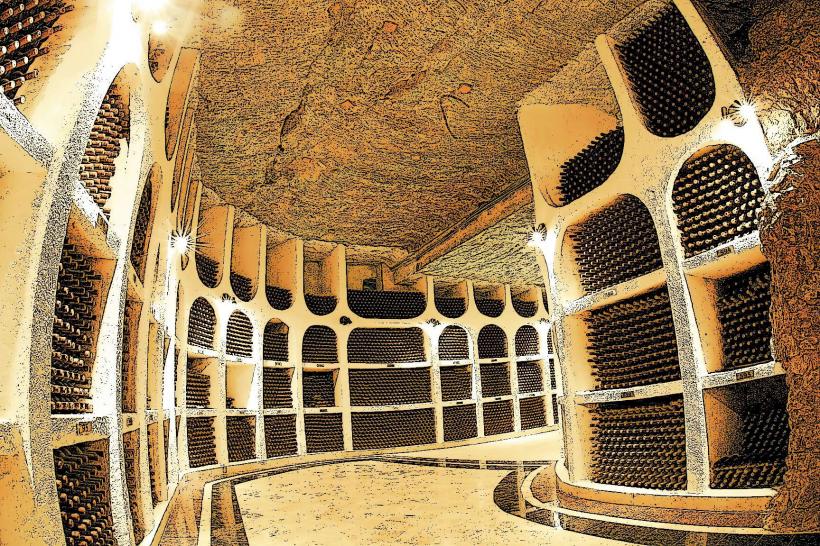Information
City: CricovaCountry: Moldova
Continent: Europe
Cricova, Moldova, Europe
Cricova serves as a key industrial and viticultural suburb of the capital, Chișinău, located approximately 15 km to the north. It is globally recognized for housing one of the world's largest and most significant underground wine complexes.
Historical Timeline
While the area has been inhabited since antiquity, the modern development of Cricova began in 1952. The primary event shaping the current urban form was the transformation of former limestone mines-remnants of the city's construction history-into a massive subterranean wine storage and production facility. In 2003, the "Cricova" wine complex was declared a "National Cultural Heritage of Moldova" by state decree.
Demographics & Population
The population is approximately 10,800. The demographic profile is predominantly Moldovan/Romanian (approx. 80%), with Russian and Ukrainian minorities. Due to its proximity to the capital, many residents commute to Chișinău for work, though the winery remains the largest local employer.
Urban Layout & Key Districts
Cricova is characterized by its dual-level structure:
The Surface Village: A residential area consisting of low-rise apartment blocks and traditional houses with private gardens.
The Subterranean City: A network of 120 km of limestone galleries located 60 to 100 meters underground, featuring "streets" named after grape varieties (e.g., Cabernet Street, Chardonnay Street).
Top City Landmarks
Cricova Winery (Underground City): A vast labyrinth used for wine maturation, featuring a national wine collection and luxury tasting halls.
The National Wine Collection: Houses over 1 million bottles, including rare vintages like the 1902 "Jerusalem Easter" wine and Hermann Göring’s private collection.
Cricova Quarry: The source of the white limestone (cochilniță) that gives the region its characteristic architecture.
Transportation Network
Transit is primarily facilitated by the Chișinău municipal bus network. Bus Line 2 and various private Marshrutkas (Route 152) connect Cricova to the capital (ride time: approx. 20–30 minutes). There is no rail or metro service. Yandex Go is the primary ride-sharing app for travel from Chișinău. Traffic is generally light, concentrated at the intersection with the M14 national highway.
Safety & "Red Zones"
Cricova is exceptionally safe. There are no neighborhoods to avoid. Visitors to the underground complex must stay with authorized guides, as the labyrinthine nature of the tunnels makes wandering alone hazardous.
Digital & Financial Infrastructure
Internet speeds average 150 Mbps via fiber-optic links. Mobile carriers are Orange and Moldcell. Card acceptance is universal at the winery and local supermarkets (e.g., Linella), though the local open-air market requires cash (MDL). ATMs are located in the center near the winery entrance.
Climate & Air Quality
Temperatures range from -4°C to 1°C in winter and 18°C to 30°C in summer. The underground galleries maintain a constant temperature of 12°C–14°C and 97–98% humidity year-round, necessitating warm clothing for visitors regardless of the surface weather. Air quality is excellent.
Culture & Social Norms
The local culture is centered on winemaking. Tipping of 10% is expected at winery restaurants. Romanian is the official language; Russian is widely used. English proficiency is significantly higher at the winery tourist center than in the residential town.
Accommodation Zones
Stay near the Winery: Limited boutique options within the winery complex or nearby "pensions" (guesthouses) catering specifically to enotourists.
Local Cost Index
1 Espresso: 35 MDL ($1.95)
1 Standard Lunch: 160 MDL ($8.90)
1 Winery Tour: 350–1,500 MDL ($19–$83) depending on tasting package.
Nearby Day Trips
Chișinău: 15 km (20 minutes by car).
Orheiul Vechi: 40 km (45 minutes by car).
Facts & Legends
A verified historical oddity is that the Cricova tunnels are wide enough to accommodate trucks and buses, which navigate the underground "traffic" daily. Local legend claims that the cosmonaut Yuri Gagarin once entered the cellars for a tasting in 1965 and emerged two days later, allegedly joking that it was easier to leave the Earth's atmosphere than to find the exit of the Cricova labyrinth.


